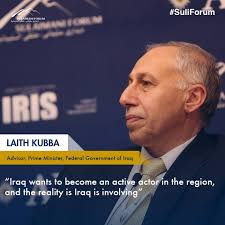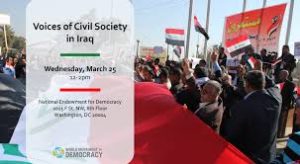The streets of Baghdad were silent Tuesday after a week of peaceful protests — against corruption, unemployment and lack of basic services — turned deadly. More than 100 people were killed as Iraqi security forces and armed groups clashed with the demonstrations and protesters were shot. PBS Newshour’s Amna Nawaz reports on the conditions that have led to the uprising.
Laith Kubba, an adviser to Prime Minister Adil Abdul-Mahdi, said this round of protests are leaderless and apolitical:
“For the younger generation, those who went into these protests, they were all born in a period where they know nothing about Saddam Hussein. They are less concerned about sectarian or national issues. They see the world through their Facebook and through their telephones, smartphones.”
 “They see how the rest of the world is living. And their questions are very, very simple. Iraq is a rich country. Why are we in such a mess?” added Kubba, a former MENA director at the National Endowment for Democracy.
“They see how the rest of the world is living. And their questions are very, very simple. Iraq is a rich country. Why are we in such a mess?” added Kubba, a former MENA director at the National Endowment for Democracy.
As the spontaneous protests — with no apparent political leadership emerging — continued to clash with security forces in Iraq cities and towns, the government appeared unapologetic and failed to offer solutions to entrenched problems, raising fears that yet another Arab nation will be mired in a long-term crisis without a path forward, AP’s
“The use of force coupled with cosmetic concessions will work to temporarily ease pressure but will not end the crisis,” said Ayham Kamel, Middle East and North Africa head at Eurasia Group. “This cycle of protests could be contained, but the political system will continue to lose legitimacy.”
Institutionalized corruption
This is a dangerous moment for Iraq, which could find itself sliding towards a more repressive and authoritarian state, according to Dr Renad Mansour, Research Fellow in the Middle East and North Africa Program at Chatham House, and Ben Robin-D’Cruz, a Researcher on Iraqi Politics at the University of Edinburgh’
 “This was one the worst weeks in Iraq’s history. I never thought the government was capable of such crimes,” exclaimed one civil society activist in Baghdad when describing the protests that ripped through Baghdad and other parts of Iraq from 1 October.
“This was one the worst weeks in Iraq’s history. I never thought the government was capable of such crimes,” exclaimed one civil society activist in Baghdad when describing the protests that ripped through Baghdad and other parts of Iraq from 1 October.
A head-on confrontation with institutionalized corruption among Iraqi politicians is the only way to address the protests gripping the country, Kubba warned. But admitting that Mahdi may not have the political capital to fight the corruption, he said: “We have problems with those political groups who have their grip over money, banks and power, and rooted to corruption. It is a problem and there is no real answer to it. My bet is, with the current political groups, Iraq cannot pull itself out of this mire,” he told the Guardian:
Kubba was speaking in London at an event at the Chatham House thinktank (above) on the future of Iraq, arranged well before the violent protests that have swept Iraq in recent days leaving as many as 19 dead.
“Corruption is so institutionalized in Iraq that it takes more than cosmetic changes like creating committees,” Kubba said. “It requires a head-on confrontation, it will come with a high political cost. Whether or not the prime minister is prepared to pay that high cost, I don’t know. It will not go away just by wishing it away. It requires a crackdown.”
 Iraq’s wobbly democracy relies on the support of the Shia majority. The protests, though, have erupted in Shia areas and attracted the support of mostly young Iraqis, many of whom are unemployed, The Economist observes. They are fed up with the government’s perceived incompetence and corruption. Iraq’s young democracy, no stranger to tumult, may be facing its most dangerous moment yet.
Iraq’s wobbly democracy relies on the support of the Shia majority. The protests, though, have erupted in Shia areas and attracted the support of mostly young Iraqis, many of whom are unemployed, The Economist observes. They are fed up with the government’s perceived incompetence and corruption. Iraq’s young democracy, no stranger to tumult, may be facing its most dangerous moment yet.
The prime minister had partly come to power to avoid a violent confrontation after the 2018 elections, Kubba said: “The situation is not normal. Iraq has 10 blocs who have real power via armed groups, they have banks, TV stations, MPs and the corruption merges with those blocs. We have a real problem.”
 He added: “The biggest challenge facing Iraq is whether it has a state, a strong state, a state based on citizenship or it has a state within a state, or multiple states … The biggest sin was to dismantle the Iraqi state in 2003 and since then Iraq has been struggling in a tough region.”
He added: “The biggest challenge facing Iraq is whether it has a state, a strong state, a state based on citizenship or it has a state within a state, or multiple states … The biggest sin was to dismantle the Iraqi state in 2003 and since then Iraq has been struggling in a tough region.”
Ahmed Ali (right) a program officer at the National Endowment for Democracy, joins other analysts at the Washington Institute (below) to discuss polling data highlighting surprising trends in public preferences on a variety of pressing governance and security issues







